Interviews
Tej Virk has a message for the Portuguese Government: “Legalize it before Germany!”
Published
2 years agoem
By
Laura Ramos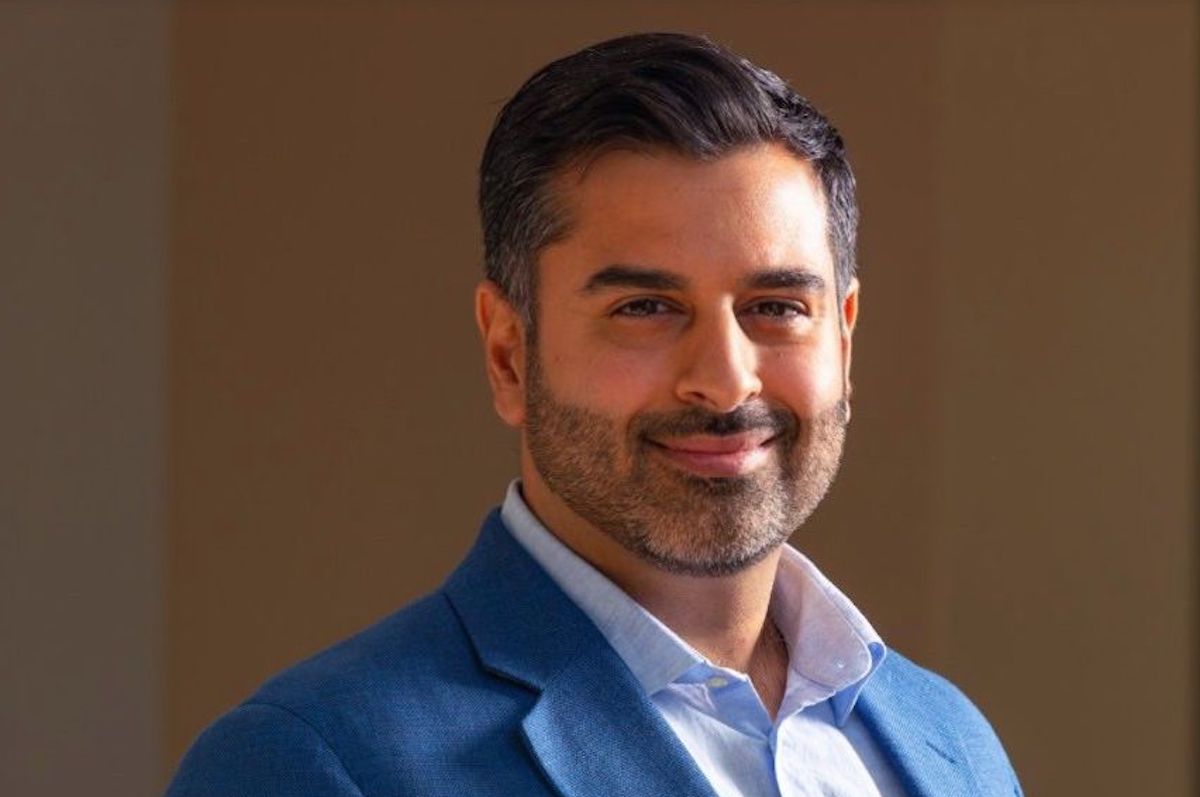
Tej Virk, CEO of Akanda Corporation, which recently acquired the Portuguese company Holigen for 26 million euros, has gained a reputation in the global cannabis space in recent years after building a solid career in banking and capital markets. Having taken over the assets of Bophelo in Lesotho and Canmart in the UK, Tej is committed to transforming Akanda into the world's leading medical cannabis company and Portugal is a strategic point for expansion. Anticipating the future, Tej already has his eyes set on the adult use market and leaves a message to the Government of Portugal: “Legalize it before Germany”.
We met Tej Virk at Holigen's facilities in Sintra, where we also met Tom Flow, from The Flowr Corporation, who sold the Portuguese subsidiary to Akanda, and we realized that they maintain a good relationship.
How did you start working with cannabis, what did you do before and how did you end up buying a medical cannabis company in Portugal?
I was born in Canada, studied there and moved to the UK in 2007. This was part of my banking career, which I did for about 15 years, focused on capital markets and finance. I was very involved in actions, where I helped to lead more than 100 IPO's (Initial Public Offering). I've helped raise billions of dollars in funding for companies in the healthcare, technology, resources and consumer spaces sectors, and I really came across the cannabis sector in 2017/2018. That's when I was starting to monitor things, as legalization was happening in the US and Canada, where I'm from, and I thought that was a big social shift. I'm a believer in freedom of choice, and having access to things like cannabis, which really have real medicinal healing value and an excellent safety profile, has led me to get more involved with real corporate funding. My previous company was very involved in the sector and 2018 is when I started meeting the CEOs of some of these big cannabis companies. Canopy Growth in particular was a client I worked with and built a relationship with and that led to a job offer to leave the bank and move to Canopy Growth where I was General Manager of the European operation.
Was that when you started a new career, in Europe?
Yes, first based in London, then moved to Frankfurt in early 2019. It was at Canopy Growth in Frankfurt where I learned the cannabis pharmaceutical business step by step, supply chain go-to-market strategy, products and how to implement them in Europe. At the time, Canopy was building a lot of business in several European countries, so I developed a network across Europe, South Africa, Latin America, Asia-Pacific and North America, it was an amazing experience. I left Canopy in late 2019 to join Khiron Life Sciences as President for Europe and the requirement to build Khiron's business from scratch in Europe. Khiron is a vertically integrated Colombian medical cannabis company. In Colombia they have a growth operation with a factory and then clinics where they put their products in the hands of patients in need and I was able to bring the brand and establish it in Europe. It was an exciting challenge and I am very happy with the progress that has been made. I left Khiron in mid-2020 to pursue this opportunity and Akanda was a company I helped found.
 What does Akanda mean, what is the origin of the name?
What does Akanda mean, what is the origin of the name?
Akanda is Sanskrit for “indestructible”, “immortal”, “strength”, and that is exactly the kind of company that we are trying to build here, a long term company that learns from the mistakes that may have been made in the sector, as it has grown very quickly. But if you look at my motivations, I mentioned how pro-choice I am and how I see the social good of cannabis. I mean, there are a lot of arguments around medicinal legalization, where there really are indications for pain, sleep, anxiety, epilepsy, where the scientific evidence is irrefutable and it's great to see that more research is being done to bring out products that help. patients, probably the most advanced will be something like GW Pharmaceuticals. But on the other hand, if there is an adult use or recreational legalization in different countries, there will be benefits and safety for consumers. If we see the tax revenues generated and these funds being directed to the places that make sense, as opposed to the black market and illicit activities and, in general, just creating an alternative – I think healthier – to alcohol, as is already the case in countries like Canada and different states in the US, so it's very exciting to see that some of that is now happening in Europe. We're starting to hear things in places like Germany, where we have the first chancellor in sixteen years, in a coalition party, talking about legalization. I think it's a very profound thing to do and I think other European countries are following that.
Have you ever had any personal contact with cannabis?
One personal thing I can mention is that I saw firsthand the life-changing effect of cannabis on my mother, who is a cannabis patient and has suffered from chronic pain for years. She went through all the opioids, physical therapy, acupuncture, even Botox injections into her soft tissue, to help numb the pain. It is a very difficult indication to treat, because many people suffer from chronic pain, but usually painkillers are only prescribed and that's it. Cannabis is an alternative and my mother has had many benefits. She was prescribed and guided by the doctor and even though Canada, where she lives, has a recreational and medical market, she goes to the doctor, because she receives this guidance and finally managed to get a good night's sleep. That's just... totally... for me, while obviously looking at the scientific evidence and seeing what happens in the market, seeing this happening in my own family is... and I actually grew up in a pretty conservative household. We weren't talking about growing cannabis, but it was a huge leap for our family and this breaking of the stigma I saw firsthand. And things have changed so fast!… So those are some of my motivations, because I want to be a part of the movement and I really want to see cannabis change the world for a better place. We are doing this with Akanda, with our operations in Lesotho – South Africa, the UK and now, more recently, Portugal.
Akanda is a very new company, how did it all start?
Akanda is an international company, a wellness and medical cannabis platform founded in mid-June 2021, that's when I joined as a co-founder. Akanda has brought together different companies from the international cannabis space, Bophello in Lesotho which is a large scale cultivation asset and CanMart in the UK which is our importer and distribution company. This was the beginning of a company focused on Europe and Africa, vertically integrated, which means “from seed to patient”, in order to have full control over the ability to bring consistent products to patients. We are a platform, which means that we bring our own product (we call it a 1P product), but we can also bring from third parties (thus, 3P). This helps with distribution and everything is governed by an ESG (Environmental, Social and Governance) and Ethics approach.

Tej Virk, CEO, with Louisa Mojela, Executive Chairman of Akanda. Photo: Akanda Corp.
How does this ESG concern arise in the company?
It's about how we operate, to ensure we're having a positive impact on the environment, society and governance. We were particularly focused on helping women and vulnerable people in the communities where we operate and this stemmed from our Executive Chairman, Louisa Mojela, who is one of Africa's most prominent businesswomen and has a long history of ESG and Ethical initiatives. Louisa is a member of some of the most prestigious boards in South Africa and for her it's really about seeing that happen, doing social good, so we're working for all three stakeholders: the patient, the shareholders and the community, and there's no reason why you can't do all three. That means meeting the UN's 2030 sustainable development goals as one company. Akanda is achieving 12 out of 17 of these goals, which is really something to be proud of. We are also affiliated with several funds in Africa where we are helping to build schools, places of worship, farmer development programs and we also put 3% of our company's equity in a trust for the benefit of the communities where we are operating. Akanda also has a mostly female, racially diverse and mostly independent board. All this is a highlight for the NASDAQ, a highlight for companies in the United States and, indeed, it is a very accomplished board, with many different achievements. One of our board members was a former director of the board of Yahoo!, another member of our board is in some of the biggest companies in South Africa, another is in the media world in Los Angeles… So, back to our company, from In a very simple way, we can describe it in three words: Grow, Move and Heal. These are our three pillars. Grow – referring to our focus on growing/manufacturing medical cannabis products; Move – it means our ability to distribute, so we have this import company that is distributing to our own channels, as well as to our partner channels (so a partner with different distributors in Europe); and Curar, it's about getting the product to patients, into their hands, to those who need it, and we're doing that, obviously, through our distribution, but we also have a partner in the UK called Cellen Life Sciences, which has the first fully digital online pain clinic and is a partner of the UK's largest street pharmacy network Boots, as well as the NHS. It is the only teleclinic of its kind that has such a partnership and also prescribes medical cannabis, using it holistically, so we are very pleased with this partnership. I think it's a model that can be taken to other parts of Europe in the future.
How did you finance the company?
We financed privately. It had pre-IPO funding of over US$5 million and in parallel we started the IPO process in the United States, which allowed us to be successful in bringing the initial public offering to NASDAQ in March 2022. The timeline was extremely fast, from the idea to the IPO it took 9 months. In total, we raised just over 20 million in the US.

Tej Virk has a good relationship with Tom Flow of Flowr Corporation. Photo: Laura Ramos | cannareporter
And how did they get to Portugal and Holigen?
When we were doing the IPO, we started looking closely at Holigen in Portugal and really saw it as the missing piece in our supply chain. Holigen brings many benefits to our company, such as European Union GMP certification, so it fits like a glove with everything that is happening in our African operation. It has its own product and a wonderful team, which is completely complementary to the team that is based here, very expertise pharmaceutical, the type of asset that is, highly differentiated across Europe. It really is a unique asset and we can't wait to start working together. We are starting this journey now and there are many opportunities to expand, both on an initial basis – this 1P that I spoke about our own product – and on a B2B basis – the 3P – which is exactly where I am interested in supporting other growers, who want to bring your products to the market through processing and our facilities. This is a service that we are interested in offering, not just in a certain field, but extending beyond that. So, really, bringing this unit to full legalization and being headquartered in Europe, having access to European markets that are growing fast… I think it's extremely important to be close to the market.
And do they also grow cannabis in Lesotho?
Yes, we do. If you look at all the cultivation in Akanda, we have sort of a complete portfolio. Lesotho is growing outdoors in some basic greenhouses and also doing some post-harvest processing – drying and product preparation. All of this has accelerated since August of last year, when we achieved GACP qualification, and we continue to make rapid progress. Holigen is an indoor grow, and when we see that we actually source different types of products, with different strengths, that gives us a lot of flexibility in the supply chain. And we also have the outdoor and greenhouses in Aljustrel.
Yes, and it's quite big, Aljustrel's land… it's about 40 hectares, isn't it?
Yeah… if I can say the exact number… I think it's 180 acres. I always mess up the math in the conversion. In the US they like to say acres, here they are acres.
I can do the conversion later… (180 acres is about 72 hectares).
That's right, more than 180 acres, so what's really interesting is that when we put together this portfolio, I think we're one of the few companies in the world that has the ability to enjoy the outdoor seasons in two hemispheres, in a kind of time zone. schedule. Lesotho's seasons are inverted in relation to Portugal, so when they are harvesting, you start to plant here and that is a very, very different flexibility, which we will use to our advantage.
Going back a little bit, when you talked about vertical integration and the “seed to the patient”, one of the problems facing Portugal is that, despite having legalized medical cannabis in 2018, four years later there are only two cannabis derivatives in pharmacies – the Sativex by GW and flowers with 18% THC by Tilray. There is not even CBD, there are no oils, there are no other types of flowers… How do you see this situation, did you know that?
We were well aware of this when making our due diligence in Portugal, to understand the market. We had several consultations, to really understand what is happening here, in the domestic market, and we said publicly that we intend to invest in the distribution of products and seek seed partnerships in Portugal. We believe that there is currently unmet demand in the market. It's clear. If you look at our management team, we have experiences bringing medical cannabis products to different parts of Europe, such as opening up early stage markets. I think we have all the tools in our skill set and our asset base to be able to do that. It's just that it will take some time and that's what we're focused on right now.
How long do you think it will take for Akanda to put products in Portuguese pharmacies?
It is difficult to set an exact date for this, but I can say that it is a priority. Coming soon.
Holigen is quite a big company, are you going to move to Portugal? And will you keep the Holigen name or change everything to Akanda?
Holigen is a subsidiary of Akanda, as are Bophello in Lesotho or CanMart in the UK. We will always do what's right for the market and what's best for patients, so when it comes to Branding and if there is a decision that needs to be made, we will make the right decision, but those are all things that we are still figuring out. Akanda is really our brand, even if we make some product labeled with something we haven't decided on… but I like the Holigen name, I like the Holigen brand, I think it has recognition and we want to build on that.
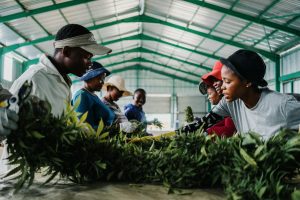
Akanda's production facility in Lesotho. Photo: Akanda Corp.
And the production in Portugal? Do you have an idea of how much you will produce this year and the next?
Well, what I can say is that we have publicly stated that the capacity of this unit indoor of Sintra is around 2 tons per year and then there is an additional capacity to process third-party products which is 7 or 8 tons. and then the outdoor in Aljustrel can produce considerably more than 100 tons, so we have a lot of flexibility and it is really in our interest to grow as fast as possible to meet the market demand. Let's start with ourselves, with the capacity we have here, and as I mentioned earlier, we are interested in working with third parties to utilize the remaining facilities. That already gives you an idea of the numbers where this might go. When it could be, it really has to do with the market and demand. One of the things I've said publicly is that we want to build a company that is profitable in today's growing medical market in Europe. This is still a market that is in the early stages on a global scale and we now have an asset base that we think can help us get to that point. At the same time, we would like to have the option of hyperscaling for the opportunity that can come with adult use, or the “recreational” changes, as we have the outdoor location, with that ease and ability to scale. It's a complicated equation to solve, because the switch can just turn on and so we need to be able to supply that market, but I think with this asset base we can do it. We have the ability to operate and grow quickly because of all that extra capacity. The focus is to do this profitably.
So at the moment Akanda is only medicinal, but they are also looking at adult cannabis use.
For sure! We made it clear that our model is premised on the global medicinal market, but European countries are looking to open up adult use markets and that is something we will definitely focus on looking at. We are building a scalable supply chain and I think being a part of that is a natural fit for Akanda. What that means in terms of brands and commerce, I cannot predict what it will be like, but I know that we want to be a part of what is happening in Europe. And we are monitoring what is happening in Portugal as well. I am hopeful and we will be ready to make changes as the government changes.
If you had the opportunity to speak to the Portuguese Government, what would you say?
Well I would say a few things. First: “Congratulations on making Portugal, probably, the center of excellence for cannabis in Europe”. This is a fast growing industry where the impact on GDP in countries like Canada and the United States is very visible, with tens of billions of dollars and I think helping make that happen here, taking advantage of the skilled people, the weather, infrastructure, that was brilliant… so “congratulations” would be the first thing. The second would be "Grab that lead and extend it." This is a chance to continue to be an advanced thinker and I am very aware that Portugal decriminalized all drugs in the early 2000s and the social impact it had. I'm also aware of the different programs the country is doing to attract investment and I think it's clear that legalizing cannabis helps the economy and the community on issues like taxation, security, reducing criminal activity... all these things are, I think , just proven, obvious results that we've seen in Canada and the United States, where this has already happened. And so, there is a chance here that Portugal is ahead. Germany might legalize in two or three years, depending on how the laws fit together, but there's a chance Portugal will continue to lead, so: legalize before Germany!
These are the “three magic words” that he had already told me before we started the interview. But why before Germany?
Well, I guess it's just… continue that lead. I also think it is a chance for the country to continue to earn this investment, to be the center of excellence, to have the entire value chain here and I think this is the first step towards gaining an advantage.
And what would you say to the most skeptical Members?
I think for skeptics I would say “look at the examples, look at the studies”. I think there is still a lot of misinformation and past stereotypes, prejudices and stigmas. Someone who has spent a lot of time analyzing facts and seeing real life examples, I think it's important to look again at countries like Canada. It is an OECD country, which has legalized it for years. It is still standing, society has not collapsed.
No, and consumption among young people, for example, has dropped.
Exactly, exactly! So I think the trends are positive, the social trends are there and there's been tax revenue as well, I mean... I think with what we've seen in places like Canada, it's a chance to emulate the success of those countries and again be leader in Europe, gain from the investment now and keep that talent here.
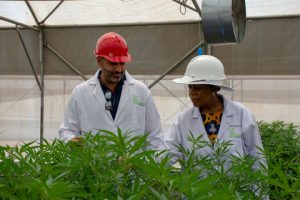
Tej Virk and Louisa Mojela at the Bophello facility in Lesotho. Photo: Akanda Corp.
Some countries, such as Canada, have also included the right to self-cultivate, not only for patients, but for small local communities, so that they can also improve access and their economy. What do you think of the right to grow at home?
Well, I mean, ultimately, it's about meeting personal demand, need, whether medical or not. I think this fits with the same kind of idea that I mentioned earlier, that there are personal rights and that people feel they can do that better than a company. I mean, it hits the same points I mentioned earlier about legalization and the benefits associated with cannabis. There is someone who is trying to provide scale, product to market, that is consistent and traceable, and that can be done on an industrial level. I'm uncertain what happens if someone does this on a small scale, like at home. If you're an excellent horticulturist, you might be awesome! If you're not, I don't know! (laughs) So I think it's a personal choice.
It's like planting potatoes or vegetables. Not everyone has a “green hand” to have plants at home…
It's very challenging! I had a small plot in London, where I live, for which I was on a waiting list for five years, just to get a small vegetable garden in the city, the size of this room… And that was 15 hours a week of work! During the pandemic it was amazing, the whole family being there, getting their hands dirty, growing our own vegetables – and there is nothing better than those vegetables, those tomatoes and lettuce, cucumbers, everything we planted was amazing! But it was also very challenging, it's hard work and there are plant diseases and we've had all these things. I think the cannabis industry has a lot of parallels that we're benefiting from now in Europe, from a lot of the experiences that the industry has had in Canada and the United States, where there's probably almost 20 years of experience of industrializing growth, so that everything affects the quality. I think that's another reason why people want companies to do this too.
What will the transition from Flowr to Akanda look like now?
Well, we're at the beginning of that journey and I think it's a really complementary management team. I think Holigen has a lot of leadership here and so do we and it fits together like two pieces of a puzzle. It's a really great fit, so I think you're going back to one of your earlier questions, which I may not have answered directly, about having a presence too… I don't know if we're moving to Portugal anytime soon, but it definitely is. something that could be a pleasant experience. I intend to have a presence here, a regular presence, and that will also help in the search for the global culture of our young company.
And how has your experience been here in Portugal?
Absolutely fantastic! The people, the natural beauty, the food… which I think is extremely underrated in Europe (laughs), and that's amazing here! Really, from a personal perspective, I'm really enjoying it and, for me, as someone who has lived in different parts of Europe and traveled a lot, I'm really excited about the possibilities for Portugal and what's happening here.
____________________________________________________________________________________________________
[Disclaimer: Please note that this text was originally written in Portuguese and is translated into English and other languages using an automatic translator. Some words may differ from the original and typos or errors may occur in other languages.]____________________________________________________________________________________________________

What do you do with €3 a month? Become one of our Patrons! If you believe that independent cannabis journalism is necessary, subscribe to one of the levels of our Patreon account and you will have access to unique gifts and exclusive content. If there are many of us, we can make a difference with little!
Related News
-


Netherlands prepares to launch pilot cannabis sales project
-


The role of endocannabinoids in the brain's stress relief mechanism
-
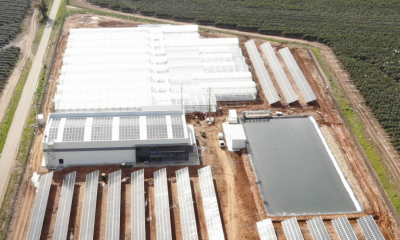

Portugal: GreenBe Pharma obtains authorization to cultivate cannabis for medicinal purposes
-
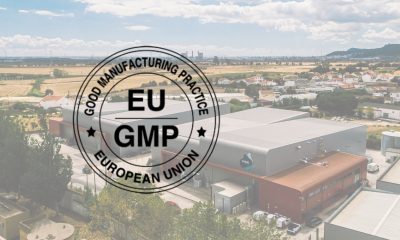

Portugal: SOMAÍ receives EU-GMP certification and obtains €5 million in financing
-


Obelisk Farm at Greenfest Braga '23 with Hemp paper Workshop
-


Argentina: Mar del Plata hosts ExpoIndustria Cannabis and Hemp 2024 this week

Mais recentes


4:20 is coming and there are celebrations in Porto and Lisbon
The date for celebrating cannabis culture is approaching! This Saturday, April 20th, is the day when...


Paul Bergholts, alleged leader of Juicy Fields, detained in the Dominican Republic
Paul Bergholts, the alleged leader of the Juicy Fields pyramid scheme, has been detained in the Dominican Republic and will be subjected to...


Cannabinoids reveal promising results in the treatment of Borderline Personality Disorder
An investigation carried out by Khiron LifeSciences and coordinated by Guillermo Moreno Sanz suggests that medicines based on...


Juicy Fields case: 9 detained by Europol and Eurojustice. Scam exceeds 645 million euros
A joint investigation conducted by several European authorities, supported by Europol and Eurojust, culminated in the arrest of nine suspects...


Regular cannabis users may require more anesthesia during medical procedures
Regular cannabis users may require more anesthesia during medical procedures to remain sedated compared to...


The future of CBD in Japan: How legal reforms will shape the market
Late last year, Japan took a big step towards cannabis reform after approving...


Portugal: GreenBe Pharma obtains EuGMP certification at Elvas facilities
GreenBe Pharma, a medical cannabis company located in Elvas, Portugal, has obtained EU-GMP certification under...


Álvaro Covões, from Everything is New, buys Clever Leaves facilities in Alentejo for 1.4 million euros
Álvaro Covões, founder and CEO of the show promotion agency 'Everything is New', which organizes one of the biggest festivals in...


ICBC returns to Berlin on April 16th and 17th
It is one of the largest and most recognized B2B cannabis conferences in Europe and returns to Berlin in...


The legalization of cannabis in Germany seen through the eyes of the hacker who created an essential map
A hacker from Koblenz, a city in the state of Rhineland-Palatinate, created a map with the places where, from...







